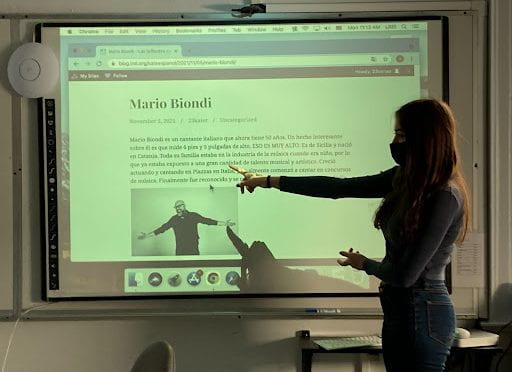Writing and teaching have always been the main drivers of my identity. Doing both at the same time has been, in one way or another, a recurring theme in my life. That is why for my self-study I’ve chosen to focus on how my own experience as a writer has impacted my teaching career throughout the years, making me develop a language program that uses writing as a central component of the practice and acquisition of a foreign tongue.
The first teaching experience I had was already intrinsically linked to my writing. With an adolescent passion, I had written a short essay on the crucial importance of literacy, inspired by my own experience teaching an illiterate sixty-year-old couple to read and write. I was so moved by their progress and being able to bring them the miracle of the written word that I couldn’t help it and wrote about it. My seventh grade literature teacher asked me to sit in her chair, read my essay to my classmates, and share that inspiring teaching experience with the entire class. That day both the teacher and the writer that I am were born in that classroom.

Many years have passed since that presentation in class. An infinity of events have shaped my life in multiple ways, as it happens to everyone. I became a true writer and teacher, lived and worked in various countries, traveled around the world, experienced the intensity and struggles of living under completely different socio-political systems, and expressed myself in various languages. But the only thing that has not changed is my commitment to teaching and writing, which has stayed with me in all those stages. Even when I used to think of them as two independent parts of my professional life, they have never really been separated from each other. After teaching many different types of students in truly diverse contexts, ranging from European universities to American journalists to the business world, twenty-four years ago I joined the high school faculty at LREI. From day one, writing was at the center of my language teaching program. Here, these two important parts of my identity came home once again, and they have made sense to me only as an inseparable unit.

As a teacher with almost five decades on the job, I have always been aware that my practices and perspectives need to keep changing constantly in order to continue to be relevant and effective to the new generations of students. In the current society, which tends to enshrine the image as the main means of cultural exchange, the deficiencies of linguistic competence of young people when communicating with each other and with the world around them is a growing problem even in its first tongue. This in itself is a total challenge when it comes to the teaching or learning of a foreign language, where the significance of words and how they are used to carry out effective communication acquire an even greater proportion.

I have worked throughout my years at LREI to design a language program based on advancing the written skills as a point of departure for developing the rest of the skills needed to achieve real fluency in the target language. This idea has been the central piece of my pedagogical process, and it is my intention to illustrate in this self-study how it works. After years of trial and error, I have come to learn that by focusing the teaching on activities that promote writing and the analysis of literary texts, it is possible indeed to achieve the full practice of the linguistic structures that allow communicative competence, the correct use of the grammar, and the acquisition of the necessary vocabulary for the oral communication in a foreign language.
At the same time, the emphasis on writing also contributes to the development of creativity and critical thinking of students. Using writing as an insightful systematic tool in a language class becomes of utmost importance for the learning process when not only linguistic fluency but also true respect for the culture and the different ethnicities and identities represented by the target language is what is expected.
The key questions of my self-study are:
- How does a full time language teacher find the time to produce his own work as a writer?
- Why must l let go of teaching in order to continue my work as an author at this point in my professional life?
- Could my personal perspective of teaching through writing be useful in the future work of the World Language department at LREI?


Antonio, I love how you have tied this reflection to the very beginnings of your work as a teacher. I think it will be equally powerful to explore how that deep personal connection to the value of the work is made manifest in the practices that you have developed over time. The dual focus of how these connections can orient you into your next adventures and how they can also provide an ongoing foundation for practice at LREI is quite powerful.